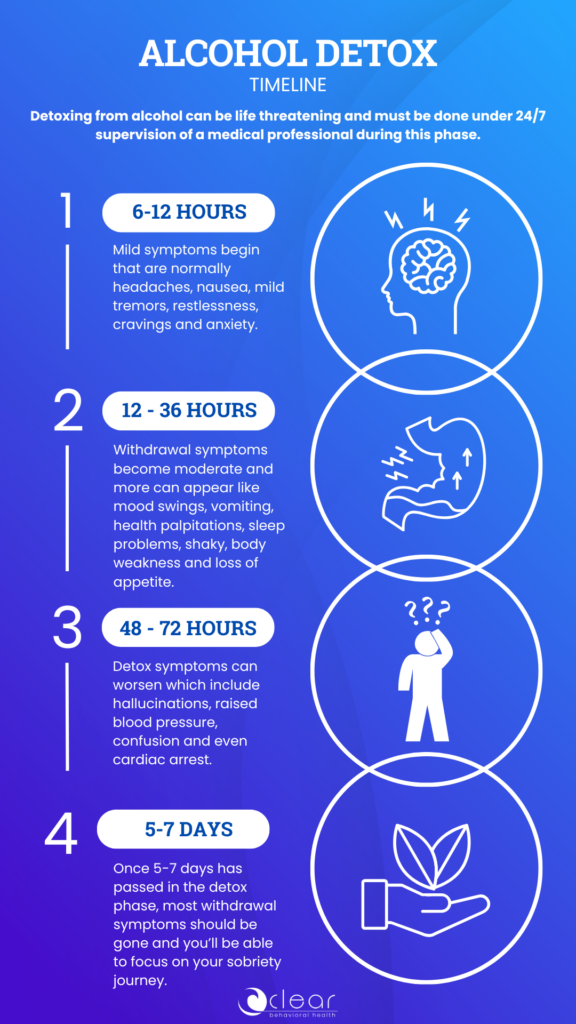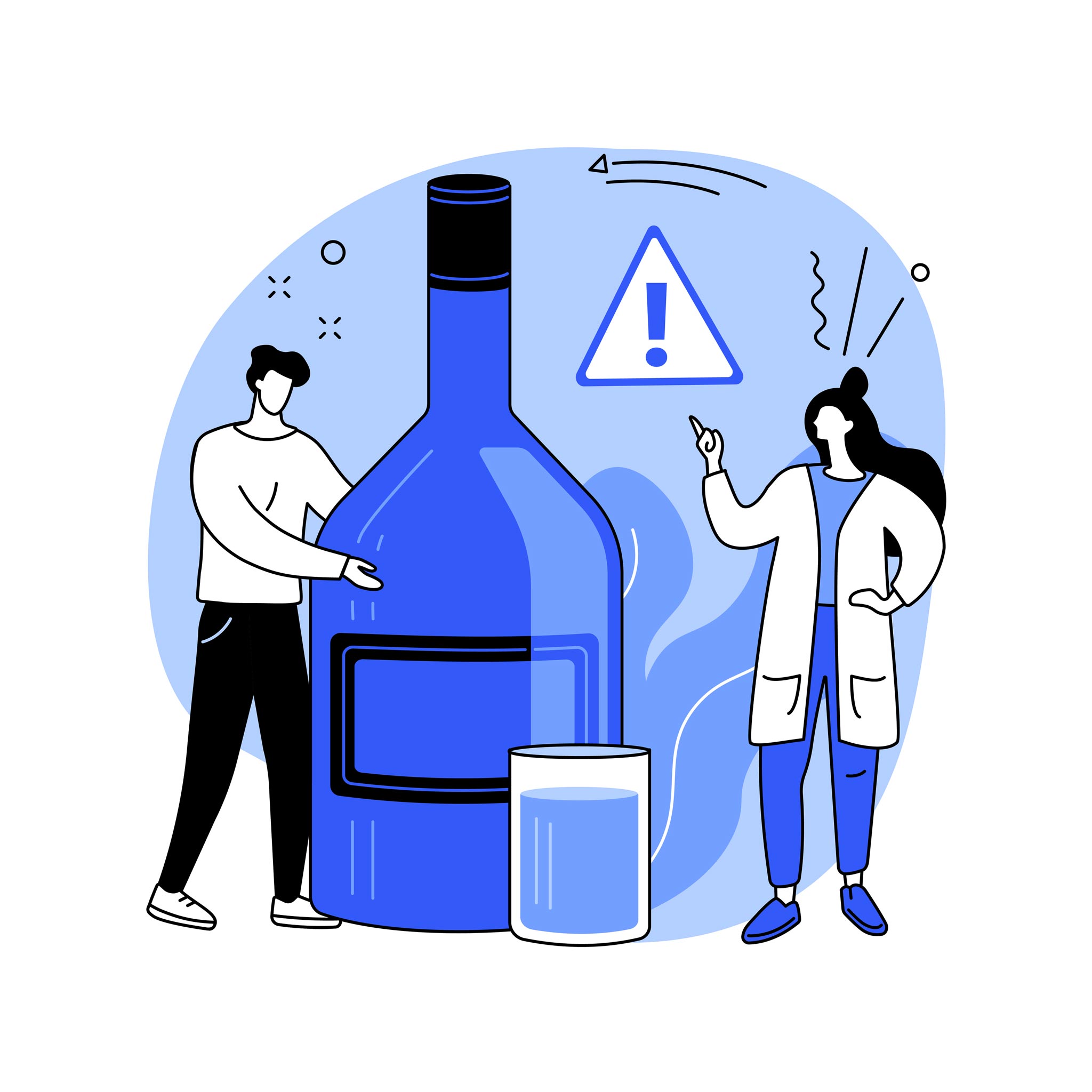Alcohol is a substance that has been used for centuries for both celebrations and coping. It’s an ingrained part of our history and society [3]. So much so, that it took a long time for people to understand the side effects alcohol has on people. After researching, alcohol was proven to have negative effects over time on the brain and body. Due to this, it also contributes to dependency and can potentially lead to full-on alcohol use disorder (AUD).
If alcohol has been a part of your life and it’s turned into a dependency, it’s important to look into how to become sober. The first step is to detox from alcohol, so your body can begin to heal while you go on your sobriety journey.
We are the trusted professionals for alcohol detox in the Los Angeles, California area. Call us today to get started.
What is an Alcohol Detox?
Detoxification, or “detox”, is the process of allowing alcohol to fully clear the body. It is one of the first parts of recovery from alcohol abuse and it can be extremely dangerous and even fatal if not performed under clinical supervision by a medical professional in a dedicated treatment facility.
During the alcohol detox process, you will begin your journey to overcoming alcohol addiction and dependence, and stop drinking. Depending on your history of alcohol or drug abuse, this can cause mild to severe alcohol withdrawal symptoms.
Medical professionals will need to be close by to monitor mild and severe withdrawal symptoms alike to provide medical care, including medication, if necessary. Certain factors play a role in the intensity and length of your detox, such as what substance was being abused, how often, and in what capacity. In most cases, detoxing from drugs or alcohol can take anywhere from a few days to a week or two.
Related: What is Detox Treatment and Why Is It So Important?
When is Detoxing from Alcohol Necessary?
The intensity, duration, and severity of detox symptoms depend on many factors. If you have been drinking alcohol or using substances for any extended period of time, attending a detox or stabilization program can be extremely helpful, and often is medically necessary for safety and comfort.
Some of the telltale signs that a medical detox is necessary include:
- Long-term substance abuse: The longer you have been using a substance, the more likely a medical detox will be necessary. It is important to remember, however, that with substances like benzodiazepines, alcohol, and opiates, you do not need to have been using them for a long time to benefit from a stabilization period.
- Alcohol withdrawal symptoms: These can be more or less severe depending on the substances used and depending on the length of use, but regardless of where they fall on the scale, having alcohol withdrawal symptoms managed under medical supervision makes them much more tolerable.
- History of seizures or other adverse physical reactions when discontinuing alcohol or drug use.
- Any other medical complications or issues that could make discontinuing substance use independently dangerous.
Detox is also imperative for those who are detoxing from substances that can cause life-threatening symptoms, including alcohol.
What to Expect When Detoxing From Alcohol
If you are addicted to alcohol, you are likely already familiar with what to expect from the alcohol detoxification process. You may have already attempted to stop drinking alcohol before or have even felt the onset of alcohol withdrawal setting in when you were unable to drink.
Treatment centers will provide you with all the information you need, but, when seeking alcohol addiction treatment, it’s important to be prepared. Alcohol withdrawal syndrome can include a range of mild symptoms to fatal complications, so, let’s discuss what to expect when you detox from alcohol.
Check out our article on Psychology Today: Latest Innovations in Alcohol Addiction Treatment and Awareness
Common Questions About Alcohol Withdrawal
You may have heard about the symptoms of alcohol withdrawal and be wondering what it might look like in your specific situation. You are not alone. Struggles with alcohol and sober curiosity can raise a lot of questions.
Here are some common questions you might ask yourself:
- How do you know if you are going to go into withdrawal when you stop drinking?
- Will you experience alcohol withdrawal symptoms?
- How severe are the most severe symptoms?
Unfortunately, there is no surefire way to answer these questions, but there are a few guidelines you can follow to help determine if detox will be part of your recovery journey.
Alcohol Detox Guidelines
Consider your past history with alcohol and ask yourself the following questions:
- How long have you been drinking?
- How much do you drink in a day?
- How often are you consuming alcohol?
If you have abused alcohol for long periods of time and/or in high amounts and frequently, it is common to experience withdrawal symptoms that require assistance from professionals. It is less common for those who do not drink lots of alcohol at a time or for long periods of time to need detox services, but it is possible and it does happen. Your best bet is to reach out to your primary care physician or a treatment specialist who can help you determine if detox is for you.
What to Expect if You Need Detox
If you do find that you require detox services, there are a number of things that you can expect. It is no secret that the first part of your experience in detox will likely be related to the withdrawal symptoms you develop. These withdrawal symptoms typically begin within hours after your last drink.
You may have some prior experience with the onset of symptoms if you have not been able to access alcohol when you needed to in the past. You might be thinking that you are aware of what to expect when detoxing from alcohol because you already know that you will have withdrawal symptoms.
Potential Dangers of Detoxing From Alcohol
Alcohol detox can be very dangerous without medical support if you have been drinking extensively or for an extended period of time. Professional detox or stabilization programs are an important part of the recovery process. They allow you to safely and comfortably step away from the substances you have been using.
If you are dependent on alcohol, meaning that you cannot stop using without developing withdrawal symptoms, it is imperative to be in the right hands when detoxing.
The first day or so of your detox will be filled with developing symptoms that range in intensity levels. By a few days in, you can begin to develop what is known as delirium tremens, or the DTs. The DTs are a set of symptoms that include confusion, high blood pressure, shaking, fever, and hallucinations. The greatest concern during this time is fever and high blood pressure, both of which can trigger strokes, seizures, and other life-threatening medical events. When in a detox program, however, these symptoms can be carefully monitored and better managed, helping you to avoid suffering long-term damage or death.
It is important to understand that, without support and monitoring during detox, withdrawal symptoms can be uncomfortable and even life-threatening. Our individualized and professional alcohol detoxification treatment helps safely alleviate the physical symptoms of withdrawal.
Related: The Dangers of Detoxing From Alcohol at Home
How Long Does It Take To Detox From Alcohol?
Here’s an Alcohol Detoxification Timeline

Phase 1: 6-12 hours
Alcohol withdrawal typically begins within the first 6 hours of detox, mild withdrawal symptoms begin to arise and will continue for 12 hours.
- Headache
- Nausea
- Mild tremors
- Restlessness
Phase 2: 12 to 36 hours
As detox continues, you might start to experience moderate withdrawal symptoms and more might arise.
- Mood Swings
- Vomiting
- Heart Palpitations
- Anxiety
- Sleep Problems
- Loss in Appetite
- Shaky
- Body Weakness
Phase 3: 48 to 72 hours
When alcohol detox has reached the 48 – 72 hours phase, it’s imperative to watch if symptoms worsen [2]. This tends to be the most challenging phase of the detox process when you might experience severe withdrawal symptoms. Medical supervision is highly recommended throughout the entire detox process for this reason.
- Hallucinations
- Raised Blood Pressure
- Confusion
- Alcohol withdrawal seizures
- Cardiac Arrest
Phase 4: 5 to 7 days
After 5-7 days, most detox symptoms should be gone, and you’ll be able to acclimate to sobriety without the difficulties of withdrawal symptoms.
After completing the alcohol detox phase, you might experience intense alcohol cravings as you continue your journey in recovery. This is why continuing treatment for alcohol addiction, whether through drug and alcohol rehab or substance abuse outpatient programs is important to improve your chances of achieving long-term sobriety.
Related: The Glow Up Journey: Using Alcohol Detox Centers to Create Lasting Change
Learn more about alcohol detox programs in the Los Angeles, California area. Contact our experts today to get started.
Medical Detoxification From Alcohol
If you are still unsure about what to expect when detoxing from alcohol, do not hesitate to reach out to Clear Behavioral Health. We offer a full continuum of care for addiction treatment with programs located throughout the Los Angeles, CA area including alcohol detox in Redondo Beach, drug and alcohol rehab in Gardena, and outpatient substance abuse programs to help you recover from alcohol addiction.
Our knowledgeable and compassionate admissions specialists can answer all of your questions and help get you started on the path of recovery, and our medical team can help you detox safely.
References:
- Alcohol and the Brain: An overview | National Institute on Alcohol Abuse and Alcoholism (NIAAA). (n.d.). https://www.niaaa.nih.gov/publications/alcohol-and-brain-overview
- Alcohol withdrawal. (2025, February 7). Cleveland Clinic. https://my.clevelandclinic.org/health/diseases/alcohol-withdrawal
- Sudhinaraset, M., Wigglesworth, C., & Takeuchi, D. T. (2016). Social and Cultural contexts of alcohol use: Influences in a Social–Ecological Framework. https://pmc.ncbi.nlm.nih.gov/articles/PMC4872611/
